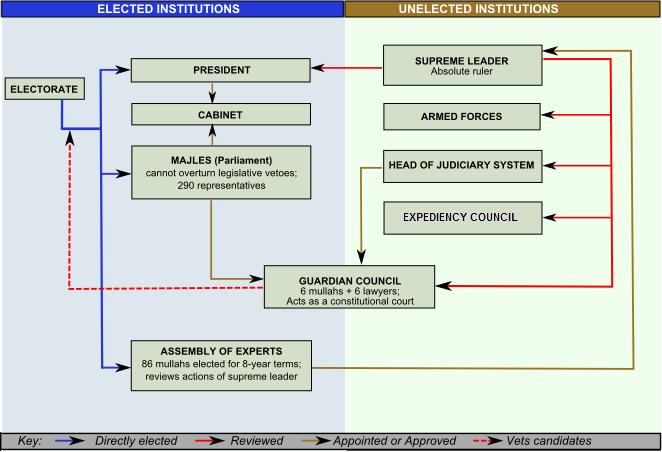Are you aware that Iran has a constitutional government....? I am aware of nothing of the sort.
This is the structure of the Iranian government as defined in the 1979 Iranian constitution (according to Wikipedia). As you can see the system is rigged to preserve the status quo. Nevertheless, all the parts of the government, including the Supreme Leader, are ultimately answerable to elected representatives. BTW this chart does not mention that the Supreme Leader is selected by and can be dismissed by the Assembly of Experts.
As a country which promotes the virtues of democracy, it seems unlikely we are going to be bombing any elected bodies, no matter what are the inherent faults of their governmental system.

This is the structure of the Iranian government as defined in the 1979 Iranian constitution (according to Wikipedia). As you can see the system is rigged to preserve the status quo. The wiring diagram you put up does not reflect the presence of a cabal of terrorist mullahs within the Majlis who run rump operations on their own hook. I mentioned Imad Mugniyeh's operations in Argentina as an example; Lockerbie as another. Unless you think the constitutional leaders of Iran signed off on those operations, you are stuck with admitting that Iran's mullahs are off the hook and accountable to nobody, and they have their own armed forces, the Pasdaran, just like the German Waffen-SS.
The SS was a private, party-run army, whose chain of command ran through Himmler to Hitler, and the Sicherheitsdienst (SD), was the Nazi Party's security organ. The SD did not answer to the Gestapo, the Reichssicherheitshauptamt (RSHA), or Admiral Canaris's Abwehr. The nominal national intelligence service, the Abwehr was gradually displaced during the war by the RSHA, remnants of which survived the war in the hands of Allied intelligence to become Reinhard Gehlen's Org. Das Org was West Germany's first security organization, and the indirect ancestor of the BND. The Abwehr and RSHA were statal organizations; the SD was not. The Org may have been arguably semistatal, and in part international, since it fed MI-6 and the CIA.
Notwithstanding all the above, Germany still had a constitutional government with extraconstitutional excrescences added by Hitler. Iran's most secret national policies are set by a cabal and executed by non-statal or at best semistatal military and intelligence organizations many of which predated the mullahs' joining the imperial, and then revolutionary government (and Hisbollah is not statal, I think you will agree). Therefore Iran does not have a constitutional government, howbeit that it may have a constitution. Likewise, Cambodia in 1977 had a government -- it just wasn't constitutional.
To sum up, if a state has a number of appendages which are not only unreviewed and unreviewable, but actually secret, or denied and disowned (terrorist groups), then I would argue, if those appendages are essential tools or projections of national policy, and their workings are both secret and deniable, then the government can be said to be unconstitutional, no matter what the legal superstructure of the state looks like.
